Ukraine's war-battered economy recovering as homegrown businesses adapt, pivot to new markets
Some companies have moved their operations out of conflict-ridden zones to start afresh elsewhere in Ukraine, while others have adapted their businesses to wartime needs.
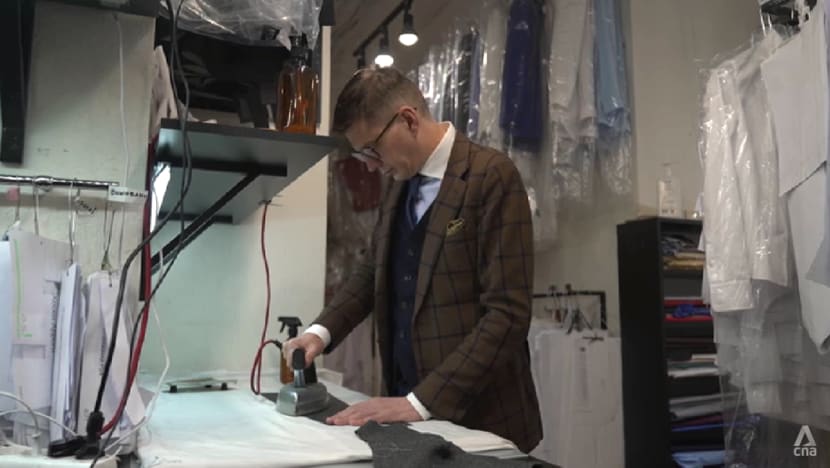
Ukrainian bespoke menswear studio Indposhiv, situated in the capital Kyiv, drew up a new range of military-inspired classics that are more in line with the times, to keep the business afloat when the market for luxury tailored suits shrank following Russia's invasion.

This audio is generated by an AI tool.
KYIV: Ukraine's businesses are innovating and contributing to the war machinery by bolstering the country’s economy.
Some companies have moved their operations out of conflict-ridden zones to start afresh elsewhere in Ukraine, while others have adapted their businesses to wartime needs.
While Ukraine’s economy is still significantly below pre-war levels, it has rebounded since Russia launched an all-out invasion of the country two years ago.
Real gross domestic product (GDP) is expected to grow by 3.6 per cent this year, according to observers.
RELOCATION BUSINESSES TO ESCAPE FIGHTING
Clean technology start-up Rekava, for instance, has had to adapt to wartime. The company uses recycled coffee grounds to produce eco-friendly disposable cups and scented candles.
Its co-founders Yuriy Tustanovskyi and Dmytro Bidiuk started the business four years ago in Sumy, a region in the northeast of Ukraine bordering Russia. The area came under attack when Russia’s full-scale invasion started on Feb 24, 2022.
The company is now based in Lviv, the largest city in western Ukraine.
Initially, the two founders moved there without their staff and equipment, said Mr Tustanovskyi.
“After two or three weeks staying here, we understood that this war is something (that will go on) for a long time,” he added.
“We decided that if we have the opportunity to take some staff, materials and production from Sumy, we should do this in Lviv, continue to work in this new city, (and see) what we can do.”
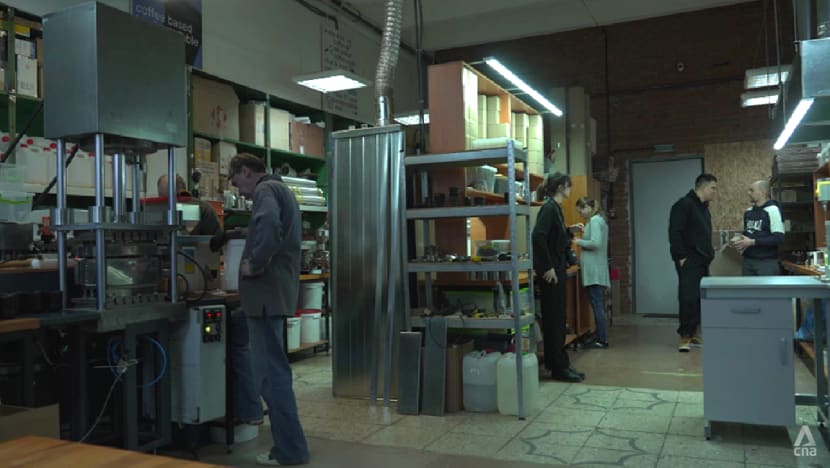
All members of their team in Lviv were displaced from regions of heavy fighting, said the firm.
Rekava has created a line of candles to remind Ukrainians that there is light in dark times, and to bring comfort through the familiar scents of home, said the founders, who hope to contribute to war efforts even if they are not on the frontline.
The candles are a bright spot for the start-up, which has seen total sales nearly double since the invasion.
“If you are not in the army, you should do what you can. It's very important not only for our microbusiness, but also for the Ukrainian economy because we pay taxes, we pay salaries, and it helps our employees and families to live a normal life,” said Mr Tustanovskyi.
“It's a very difficult period right now, and it's very important for each entrepreneur to continue to grow and to support the Ukrainian economy.”
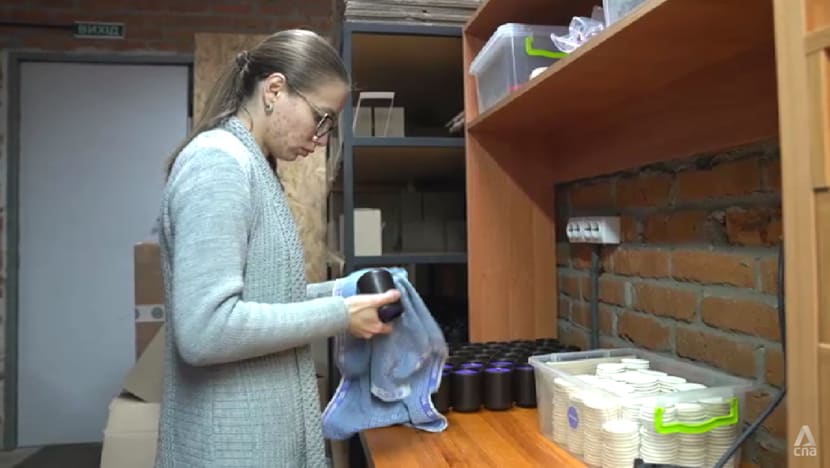
GROWING HIGH-TECH FIRMS
The city of Lviv has become the main hub for relocating businesses seeking to escape the worst of the fighting.
“A lot of companies relocated mostly from the centre of Ukraine or east of Ukraine to our city,” said Lviv Deputy Mayor for Economic Development Andriy Moskalenko.
“Some of them were here for one month and went back to their cities. Some of them stayed here to open, like (starting) some branches.”
Of the more than 1,000 firms that have moved there, about a hundred remain.
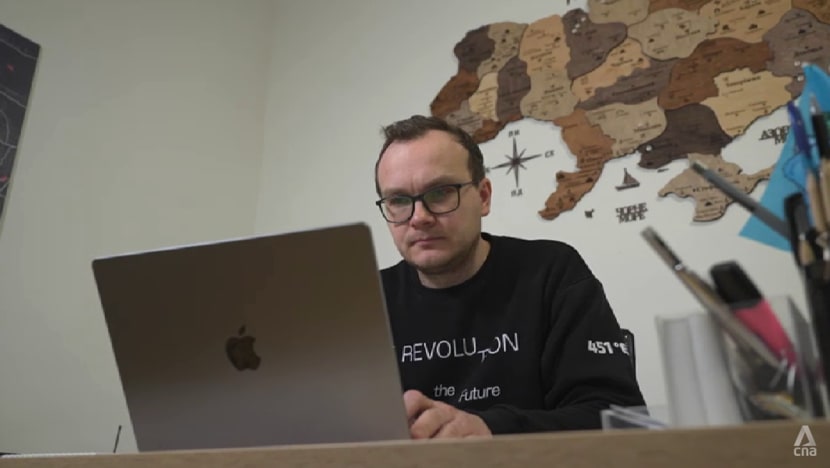
Mr Moskalenko wants to help grow high-tech firms that can contribute to the war and post-war recovery.
“We have to look deeper, so we are right now rethinking our strategy and we focus on innovation (and) economy,” he said, adding that these include defence and medical tech.
“Our idea (is) to pay for some research and for some invention.”
EXPRESSING GRATITUDE FOR SOLDIERS ON THE FRONTLINE
Bespoke menswear studio Indposhiv, situated in the capital Kyiv, is among the businesses that stood firm in the face of attacks.
Its owner Kateryna Vozianova fled to Lviv with her two children when the invasion began, but came back after two months because she felt more at home there.
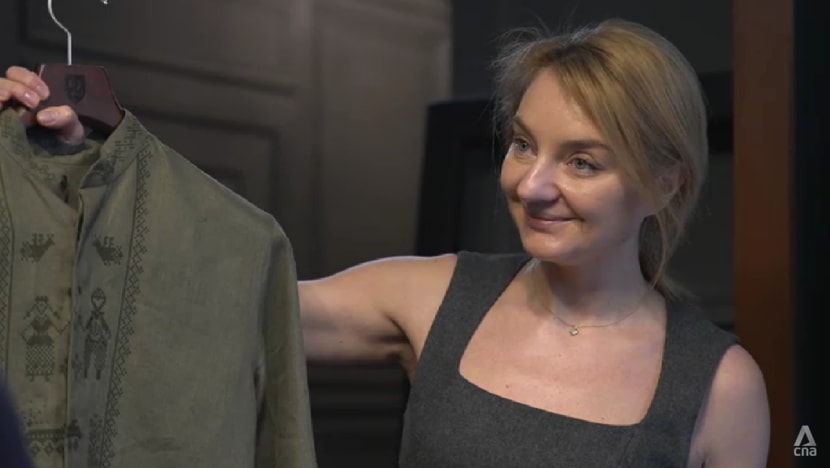
“The major thing that affects our business right now is people. Because when the war started, we had several employees who went to war. They volunteered,” she said.
“We have a lot of employees who have left for abroad and they never came back. So the beginning of the war was very challenging for us, because our team is the most precious thing we have.”
When the market for luxury tailored suits shrank following the invasion, Indposhiv drew up a new range of military-inspired classics that are more in line with the times to keep the business afloat.
“We will tailor 12 bespoke suits, one in a month for those guys. It will be free of charge for them,” she added.
“It's a very small thing that we can do for them, thanks to whom we are all here, we are alive and we can do something. We can do our business, we can secure our workplaces. And it's a way we express our gratitude to them for everything they are doing for us.”



















